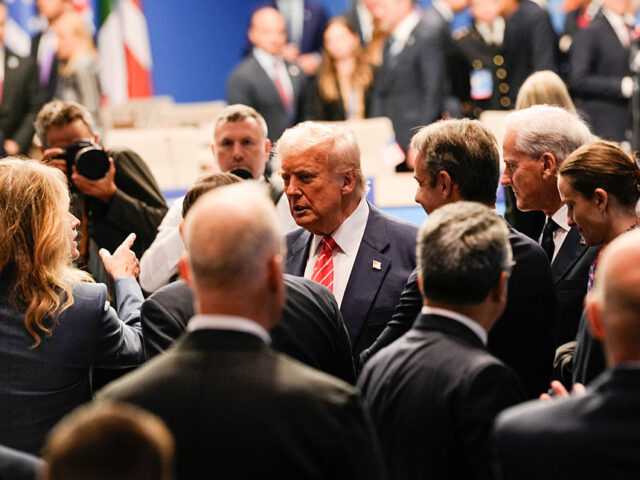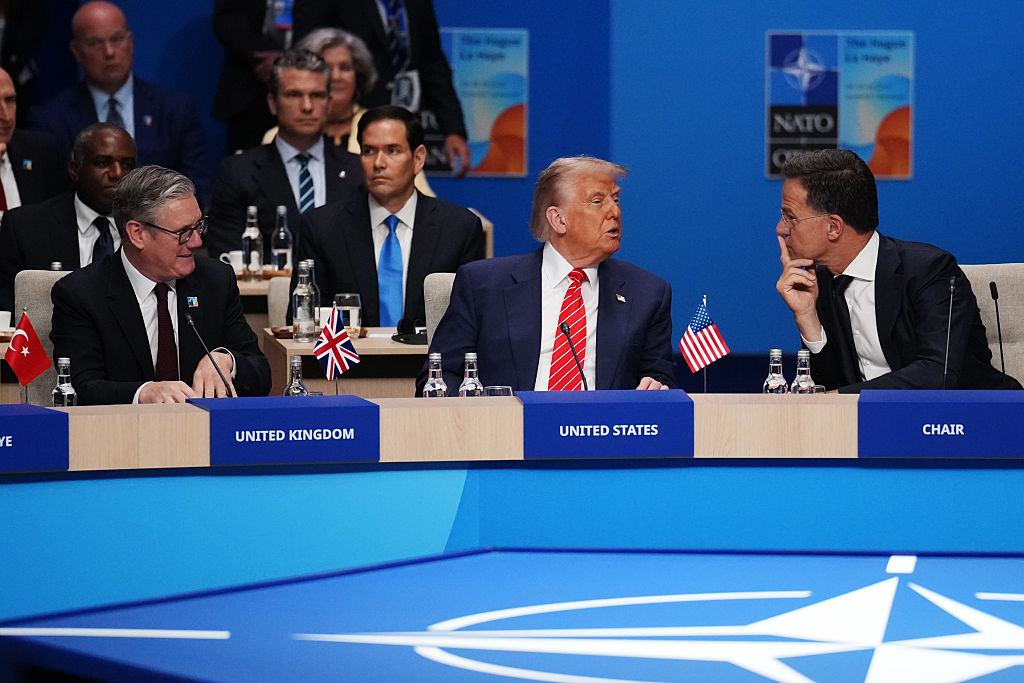Trump Confirms U.S. Backs NATO ‘All The Way’ as Alliance agrees Massive Defence Spending Rebalance to Europe

“NATO is going to become very strong with us”, U.S. President Donald Trump said as he arrived at the alliance summit at The Hague where member states are to “unanimously” agree to push the defence spending floor from two to five per cent of GDP.
Appearing to answer criticism that he had been “ambiguous” on the United States backing NATO’s Article 5 clause that an attack on one is an attack on all, President Donald Trump said in the opening moments of the alliance summit in the Netherlands on Wednesday that “we’re with them all the way, if you take a look at the numbers we’re with them. They have very big things to announce today”.
Taking a victory lap on NATO agreeing to Trump’s demand that the absolute minimum any given member state will spend on defence rises to five per cent, the President said: “I’ve been asking them to go up to five per cent for a number of years, and they’re going up to five per cent from two per cent, and a lot of people didn’t even pay the two per cent… NATO is going to become very strong with us”.

THE HAGUE, NETHERLANDS – JUNE 25: (L-R) Sir Keir Starmer, Prime Minister of the United Kingdom looks on as U.S. President Donald Trump speaks to NATO General Secretary Mark Rutte during a North Atlantic Council plenary meeting at the NATO Summit on June 25, 2025 in The Hague, Netherlands. (Photo by Andrew Harnik/Getty Images)
That President Trump’s attempts over the past decade to push NATO’s Europe and Canada members to shoulder more of the cost of their own defence actually weakens NATO or could kill the alliance has long been a line of attack from the left against Trump. Yet particularly after his first term when it became clear his bitter-medicine approach to jolting the alliance out of a state of post-Cold War complacency was actually working and seeing a trillion dollars of new non-American spending pouring into NATO, leaders have acknowledged the Trump approach.
Speaking to this as he sat alongside Trump on Wednesday morning, NATO Secretary General Mark Rutte hailed the U.S. President for making a stronger alliance possible. He said: “…it is fair to equalise with the United States. With this five per cent the Europeans and the Canadians will equalise their defence spending with the United States, so this is not about American taxpayers paying more, it is about European and Canadian taxpayers paying more.
“Again this would not have happened [without Trump]… some people might criticise me but then when I speak with them they say ‘you’re right, this would not have happened had [Trump] not been elected in 2016 and re-elected last year, and back into office in January’, so I want to thank you”.
Rutte also stated the demonstration of American power in hitting Iran’s nuclear programme in one massive and decisive strike improved the prospects of world peace as it underlined Washington’s ability to enforce good behaviour if absolutely necessary. He continued: “you took out the nuclear capability of Iran, this is crucial.
“You did it in a way which is extremely impressive, but the signal sent to the rest of the world that this President, when it comes to it, yes he’s a man of peace but if necessary he’s willing to use strength. The enormous strength of the American military. I think that signal to the rest of the world, this is far beyond Iran, is extremely important”.
After the remarks, the NATO heads of government meeting commenced and is expected to result in a unanimous agreement to approve the new five per cent rule, superseding the old two per cent rule adopted in Wales in 2014, a bid then to get the alliance out of the doldrums of minimal spending post-Cold War. As NATO leaders are wont to repeat, the world is now out of that post-war phase and has entered a pre-war one, and the alliance states it must prevent a new, massive conflict by being strong enough to deter aggression.
As previously expressed by Rutte, the fact Ukraine was unable to deter Russian aggression with its pre-war military spending and preparations means it now, proportionally, spends ten times more of its GDP on war than European states do. In other words, double defence spending to deter tomorrow’s war is better than failing to deter and having to actually fight in the future.
The five per cent floor — not a target, as it is often called — is to comprise of two distinct parts. On one hand 3.5 per cent of GDP of any NATO member state should be spent on conventional defence, calculated the same way the old two per cent was hitherto. An additional 1.5 per cent will be counted from broader investment to make NATO societies more resilient, for instance by building new arms factories, dual-use infrastructure like roads or airports that can be used to disperse fighter jets, or working on civil defence.
Earlier this month Rutte particularly cited new factories as an important element of deterrence, because a potential future adversary will price in whether NATO can realistically continue to fight after initial stockpiles are exhausted into its cost-benefit analysis.
The policy to push Europe to stand on its own two feet is a major reversal of decades of American strategy to reduce the independence of European allies, creating what has been called a network of “vassal” states bound by dependence on Washington. Either willingly or unwillingly, practically all of Europe was eventually led to this point by the end of the 20th century where anything beyond small-scale operations required American assistance.
As previously reported on the new Trump administration’s rejection of the post-Second World War world order:
Vance cited the Suez crisis of 1956, in which the United Kingdom and France moved to assert their position as global military powers but were slapped down by the United States amid its pursuit of decolonisation. Ultimately, coming so soon after the Second World War, London and Paris were not in a position to push back against Washington and were forced to accept a new position as security clients to America, to greater or lesser degrees over time.
While this unforgiving attitude towards its own allies gave Washington diplomatic leverage in opposing Soviet imperialism, it also served to disengage two of America’s most militarily consequential allies in the long term. This eventually created and contributed to the situation that American voters now oppose, the U.S. as the sole major power on the pro-liberty side of the world and American taxpayers being forced to bear the lion’s share of the burden of defending the West… Vance continued that Charles De Gaulle, the prodigiously French-chauvinist leader at the time of these decisions, was a great fan of America, but at the same time “recognised what I certainly recognise, that it’s not in Europe’s interest, and it’s not in America’s interest, for Europe to be a permanent security vassal of the United States… I don’t think that Europe being more independent is bad for the United States — it’s good for the United States.”
“Just going back through history, I think — frankly — the British and the French were certainly right in their disagreements with Eisenhower about the Suez Canal.”
Read more at Breitbart News.
Even in the era of NATO defence spending floors, some nations have been better behaved than others, and the extreme discrepancies of some wealthy states having neglected their own militaries to the point of dysfunction under the assumption of the American nuclear umbrella appears to have been what pushed President Trump to first raise these points over a decade ago. Perhaps the worst offender was Germany, which despite being the wealthiest country in the European Union also had one of the worst-funded militaries.
While Germany has been playing catch up since, others still drag their heels. A handful never made the two per cent floor and Spain’s socialist government is understood to have negotiated itself an exemption from the five per cent rule, so insistent is Madrid that it spend no more money on self-defence. Whether this exemption will survive first contact with President Trump may be answered in the course of today.